|
|
|
Sort Order |
|
|
|
Items / Page
|
|
|
|
|
|
|
| Srl | Item |
| 1 |
ID:
149566
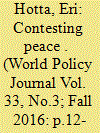

|
|
|
|
|
| Summary/Abstract |
Throughout Japan’s history, leaders have used a rhetoric of peace to justify aggression and imperialism. Peace is an apparition, historian Eri Hotta argues, that needs to be challenged if the country is to come to terms with its wartime past and confront the virulent nationalism of Japan’s conservative government.
|
|
|
|
|
|
|
|
|
|
|
|
|
|
|
|
| 2 |
ID:
005634
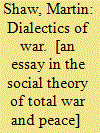

|
|
|
|
|
| Publication |
London, Pluto Press, 1988.
|
| Description |
250p.
|
| Standard Number |
0745302580
|
|
|
|
|
|
|
|
|
|
|
|
Copies: C:1/I:0,R:0,Q:0
Circulation
| Accession# | Call# | Current Location | Status | Policy | Location |
| 029809 | 303.66/SHA 029809 | Main | On Shelf | General | |
|
|
|
|
| 3 |
ID:
103508
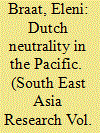

|
|
|
|
|
| Publication |
2011.
|
| Summary/Abstract |
The international disarmament debate of the 1920s provided an important opportunity for the Netherlands to raise the international profile of its colonial interests. This paper examines how Dutch participants in the disarmament debate combined the long-lived Dutch principle of neutrality with the different geopolitical situation of the Dutch East Indies. It shows that (1) Dutch delegates did not strictly interpret and apply the principle of neutrality to their colony in the Pacific. This seems contrary to (2) the Dutch perception that the position in Europe was almost identical to the situation in the Pacific. The little attention paid to these different interests in the Netherlands and the Dutch East Indies arguably developed from (3) a surprising naivety and provincialism concerning the geopolitical position of the Dutch East Indies. These three related conclusions illustrate the unfortunate composition of the delegations to the disarmament negotiations and the ignorance with which the Foreign Ministry intervened in colonial issues, arguably also indicating that Dutch colonial external relations and defence policy were ill-defined and not effectively adapted to the Pacific context.
|
|
|
|
|
|
|
|
|
|
|
|
|
|
|
|
| 4 |
ID:
098662
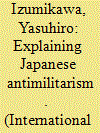

|
|
|
|
|
| Publication |
2010.
|
| Summary/Abstract |
Since the late 1990s, Japan has sent increasing numbers of its military forces overseas. It has also assumed a more active military role in the U.S.-Japan alliance. Neither conventional constructivist nor realist approaches in international relations theory can adequately explain these changes or, more generally, changes in Japan's security policy since the end of World War II. Instead, Japan's postwar security policy has been driven by the country's powerful antimilitarism, which reflects the following normative and realist factors: pacifism, antitraditionalism, and fear of entrapment. An understanding of the influence of these three factors makes it possible to explain both Japan's past reluctance to play a military role overseas and its increasing activism over the last decade. Four case studies-the revision of the U.S.-Japan Security Treaty in 1960, the anti-Vietnam War period, increases in U.S.-Japan military cooperation during détente, and actions taken during the administration of Junichiro Koizumi to enhance Japan's security profile-illustrate the role of antimilitarism in Japan's security policy. Only through a theoretical approach based on analytical eclecticism-a research strategy that considers factors from different paradigms-can scholars explain specific puzzles in international politics.
|
|
|
|
|
|
|
|
|
|
|
|
|
|
|
|
| 5 |
ID:
121598


|
|
|
|
|
| Publication |
2013.
|
| Summary/Abstract |
Although pacifism and nonviolence bear a close relationship to one another historically, pacifism is the ideological assertion that war and violence should be rejected in political and personal life, whereas nonviolence refers to a distinct set of political practices. Unlike other modern ideologies such as liberalism and socialism, pacifism has never gained widespread acceptance among a significant portion of humanity and seems to remain a minority position among most of the peoples of the world. Even among those who use nonviolent techniques, the conventional wisdom that physical violence is necessary under certain circumstances often prevails. However, a growing body of empirical evidence shows that the methods of nonviolence are more likely to succeed than methods of violence across a wide variety of circumstances and that more people are using nonviolence around the world. At the same time, both the effectiveness of military and material superiority in achieving political ends and the incidence of warfare and violence appear to be waning. In a remarkable example of convergence between empirical social science and political theory, explanations for the effectiveness of nonviolence relative to violence point to a people-centered understanding of power. This research can provide a basis for a reinvigorated and pragmatic brand of pacifism that refocuses the attention of political scientists on the organization, actions, and loyalties of people as opposed to technologies of domination and destruction.
|
|
|
|
|
|
|
|
|
|
|
|
|
|
|
|
| 6 |
ID:
086622
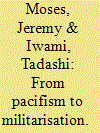

|
|
|
|
|
| Publication |
2009.
|
| Summary/Abstract |
The pacifist commitment contained in Article 9 of the Japanese constitution has long been a source of scholarly interest and debate. While the insertion of the clause in the post-Second World War constitution was originally justified by General MacArthur (amongst others) as an expression of the 'high ideals' of liberalism and democracy that Japan was now embracing, it has since been derided as an impediment to effective Japanese participation in wars fought by the United States that are claimed to be in defence of freedom and democracy. This reversal of liberal logic became evident in the early years of the Cold War as Japan was encouraged to support the US in the Korean War and has strengthened in the years since. From the first Gulf War of 1991, up to the current War on Terror, much has been made of the constraints that Japan faces in supporting the 'defence of freedom' on a global scale. This paper aims to show the place of liberal discourses in relation to the pacifist clause in order to highlight the great ambiguity and inconsistency that exists in liberal claims concerning the promotion of peace in international affairs. In the context of tensions over Taiwan and North Korea, as well as the potential for controversial 'humanitarian' roles for the Japanese military in the South Pacific, these normative questions aim to shed light on the potential dangers of Japanese remilitarisation on liberal-internationalist grounds.
|
|
|
|
|
|
|
|
|
|
|
|
|
|
|
|
| 7 |
ID:
047100


|
|
|
|
|
| Publication |
Oxford, Clarendon Press, 2000.
|
| Description |
xxviii, 799p.Hbk
|
| Contents |
Vol. I.: The build-up of German Aggression.
|
| Standard Number |
019822866X
|
|
|
|
|
|
|
|
|
|
|
|
Copies: C:1/I:0,R:0,Q:0
Circulation
| Accession# | Call# | Current Location | Status | Policy | Location |
| 044365 | 940.540943/DEI 044365 | Main | On Shelf | General | |
|
|
|
|
| 8 |
ID:
105212


|
|
|
|
|
| Publication |
2011.
|
| Summary/Abstract |
This paper explores the policy choices of Germany and Japan for contributing to international security and stability in Afghanistan. Both countries have been closely involved with Afghanistan in the aftermath of the 9/11 attacks 2001. It is argued that the policy choice of Japan with a low military element and high civilian element differs significantly from the German military centered approach. An analysis of the goals and motives behind the foreign policy choices reveals that in Germany the military involvement has been justified with humanitarian reasons, national self interests and the right to "unlimited" sovereignty. This logic has ultimately led to the acceptance of civilian casualties and participation into offensive counterinsurgency operations. It is suggested that elite driven discourses have determined foreign policy strategy. In the case of Japan the paper claims that the conservative LDP elite had been pushing for intensified military involvement which materialized in the dispatch of military vessels to the Indian Ocean and ground forces to Iraq. Similar to Germany these moves towards gaining international reputation were rooted in domestic politics.
|
|
|
|
|
|
|
|
|
|
|
|
|
|
|
|
| 9 |
ID:
103997
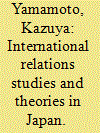

|
|
|
|
|
| Publication |
2011.
|
| Summary/Abstract |
A common view of Japan's International Relations (IR) studies in the post-World War II period is that they are characterized by pacifism and historical approaches. This paper argues that while pacifism has continued to serve as the basis of them, the approaches adopted by researchers have become increasingly diversified. Specifically, although the main issues for Japanese IR studies in the postwar period (i.e. defense strategy, world political economy, and global issues) have been consistently addressed by researchers on the basis of pacifism, the theoretical orientation of researchers has continually become stronger. Finally, this paper argues that both changing and continuous characteristics of IR studies in Japan have been supported by global developments, and concludes that this trend will continue into the near future.
|
|
|
|
|
|
|
|
|
|
|
|
|
|
|
|
| 10 |
ID:
141734
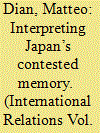

|
|
|
|
|
| Summary/Abstract |
This article applies an interpretive approach to account for the process of definition and contestation over wartime memory in Japan. It first locates the role of memory in interpretive theory, emphasising how beliefs about the past are a crucial component of foreign policy traditions. Second, it highlights how the process of contestation over a country’s memory is fundamentally intertwined with attempts to legitimise or resist key foreign policy decisions in response to contemporaneous dilemmas that force a confrontation with historical traditions. This is illustrated through an analysis of the Yoshida Doctrine’s problematic compromise between conservative and progressive traditions of thought about Japan’s role in the Second World War, beginning with the period of US Occupation, moving through the Cold War years and ending with the death of the Shōwa Emperor in 1989. Finally, it studies the ‘normalisation’ of Japanese foreign policy during the post-Cold War Heisei period, the dilemmas caused by the debate over wartime memory and the effort to achieve reconciliation with other Asian nations. The central argument is that post-war Japanese foreign policy has generally represented an uneasy and evolving compromise between the conservative and progressive traditions.
|
|
|
|
|
|
|
|
|
|
|
|
|
|
|
|
| 11 |
ID:
098065
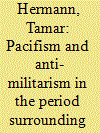

|
|
|
| 12 |
ID:
084625


|
|
|
|
|
| Publication |
2008.
|
| Summary/Abstract |
This article presents some pacifist ideas developed in various economists' works since the origins of economic thought. The Classicals considered international peace to be a normal result (as well as a necessary condition) of economic development and human progress. Such a conception is also shared by other schools of thought, such as Utopian socialism or institutionalism. Some economists were active in the development of the pacifist movement before the First World War, which led to the organization of several international Peace Congresses. During the Cold War, certain economic studies on military expenditure and the arms race contributed to the denunciation of an excessive militarism. However, the post-Cold War disarmament highlighted the costs of the necessary peace investment. There is a substantial research agenda and a need for more academic economists to undertake analytical and empirical work in this important field.
|
|
|
|
|
|
|
|
|
|
|
|
|
|
|
|
| 13 |
ID:
045332
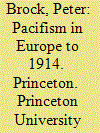

|
|
|
|
|
| Publication |
Princeton, Princeton University Press, 1972.
|
| Description |
x, 556p
|
| Standard Number |
75166362
|
|
|
|
|
|
|
|
|
|
|
|
Copies: C:1/I:0,R:0,Q:0
Circulation
| Accession# | Call# | Current Location | Status | Policy | Location |
| 010506 | 303.6609402/BRO 010506 | Main | On Shelf | General | |
|
|
|
|
| 14 |
ID:
157797
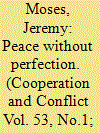

|
|
|
|
|
| Summary/Abstract |
It is common in international relations thought to view realism and pacifism as lying at opposite ends of a spectrum on the permissibility of war. Pacifism, from this point of view, is necessarily antithetically opposed to and incompatible with realist thinking on the use of force. This article aims to counter this view and raise some critical questions concerning the incompatibilities of realism and pacifism through an examination of some points at which they may be seen to intersect. In pursuing these intersections, the first part of the article sets out the foundations of classical realist thought, focusing on the inherently conflictual depiction of human nature as the basis for a theory that insists upon the inescapable possibility of political violence. It then departs from the conventional narrative by setting out the intersections of pacifist and realist thought concerning the illogical and dangerous attempts to moralise war-fighting through the application of just war theory. Finally, it is proposed that a synthesis of some elements of pacifist and realist thought could lead to the development of new theories and strategies attuned to the promotion of non-violence in an inherently unstable and conflict-prone world.
|
|
|
|
|
|
|
|
|
|
|
|
|
|
|
|
| 15 |
ID:
104037
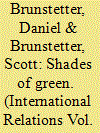

|
|
|
|
|
| Publication |
2011.
|
| Summary/Abstract |
The German Green Party's evolution from an absolute pacifist party to what we call engaged pacifism during the period from 1992 to 2005 deserves the attention of just war scholars because such an evolution shows how and why pacifists can come to accept - and limit - the use of force. Because the German Greens' values are embedded in pacifist principles linked to Germany's strategic culture - a presumption against war, fear of state power politics and escalation, and a deep sensitivity to war's destructiveness - their foreign policy outlook is defined by an alternative logic encompassing different strategies and goals compared to the just war tradition. The Kosovo crisis and the War on Terror demonstrate how the Greens' engaged pacifism offers a form of critical solidarity with the just war tradition by serving as a check on certain interpretations of the jus ad bellum criteria.
|
|
|
|
|
|
|
|
|
|
|
|
|
|
|
|
| 16 |
ID:
073642
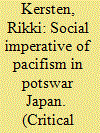

|
|
|
|
|
| Publication |
2006.
|
| Summary/Abstract |
Postwar Japanese history is often analyzed from the perspective of peace and democracy. Both ideas represented an interpretation of the war experience on the part of postwar progressive thinkers that saw postwar pacifist activism assume an anti-State character. But another important part of this intellectual context was its pro-society inclination. Social agency and autonomy became the main objectives of postwar progressive thinking, and it was this that drove the intellectual activism and advocacy of postwar pacifist movements. But how did intellectuals conceptualize society, and what were the consequences of this conceptualization for the actual development of pacifist movements? Through examining the intellectual leadership of postwar pacifist movements we can begin to appreciate how the peace-democ-racy paradigm actually worked. A pioneering thinker in this respect was Shimizu Ikutar?, who was a central figure in Japanese pacifism in the 1950s, and a leading activist in the first anti-base movement at the village of Uchinada in 1953-54. It was in the context of this movement that Shimizu developed and articulated his ideas about society and peace. In the process, he revealed the dissonance in his thinking concerning "commoners," and commenced his own intellectual disintegration as a progressive thinker. The consequences of the Uchinada protest for postwar popular and intellectual movements for peace would be formative, eventually leading to the cataclysm of the failed anti-security treaty movement of 1960.
|
|
|
|
|
|
|
|
|
|
|
|
|
|
|
|
| 17 |
ID:
026069
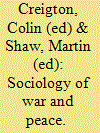

|
|
|
|
|
| Publication |
London, Macmillan, 1987.
|
| Description |
viii, 245p
|
| Standard Number |
0-333-41838-7
|
|
|
|
|
|
|
|
|
|
|
|
Copies: C:1/I:0,R:0,Q:0
Circulation
| Accession# | Call# | Current Location | Status | Policy | Location |
| 029418 | 303.66/CRE 029418 | Main | On Shelf | General | |
|
|
|
|
| 18 |
ID:
115270
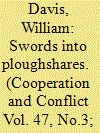

|
|
|
|
|
| Publication |
2012.
|
| Summary/Abstract |
This analysis focuses on the effects of domestic public pacifist opinion and international security threats on foreign policy outputs. Much work has suggested that governments' foreign policy outputs are responsive to public opinion in advanced democratic countries. Using the cases of several Western democracies, this article offers a theory of the effect of public pacifism on foreign policy. It employs a cross-sectional time-series analysis over a period of a quarter century to test the theory and the generalizability of the hypothesis of an opinion-foreign policy nexus using new measures and broader data. Results here contradict literature on expected public opinion and policy outputs in the Cold War period, yet are supported after. The findings indicate that the predicted effect of public opinion on foreign policy outputs to be conditional on the presence of security threats. Convergence between leaders and public opinion in post-Cold War Western democracies is likely to make hawkish foreign policy less tenable in the West.
|
|
|
|
|
|
|
|
|
|
|
|
|
|
|
|
| 19 |
ID:
066185
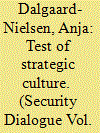

|
|
|
| 20 |
ID:
025640
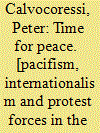

|
|
|
|
|
| Publication |
London, Hutchinson, 1987.
|
| Description |
195p.
|
| Standard Number |
0091675502
|
|
|
|
|
|
|
|
|
|
|
|
Copies: C:1/I:0,R:0,Q:0
Circulation
| Accession# | Call# | Current Location | Status | Policy | Location |
| 028166 | 327.1720/CAL 028166 | Main | On Shelf | General | |
|
|
|
|
|
|
|
|
|